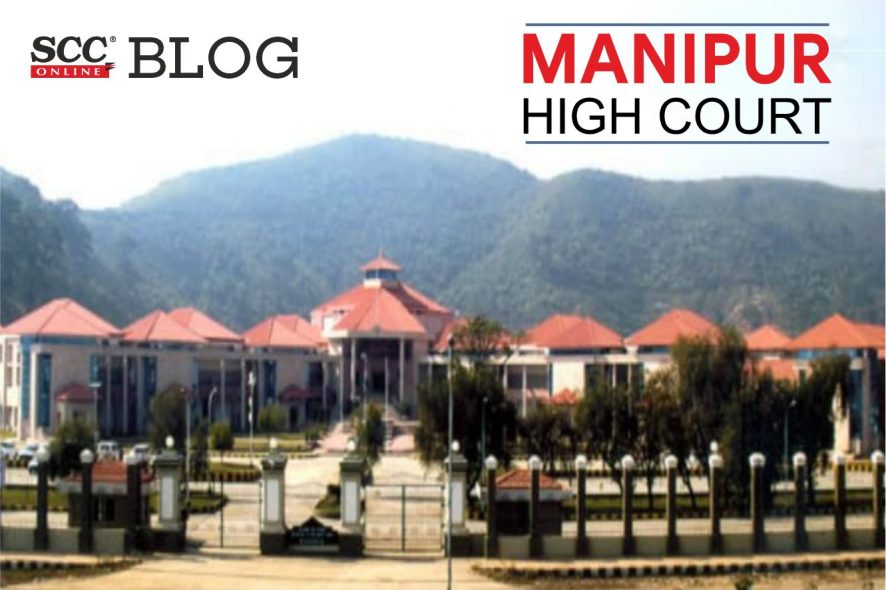Manipur High Court: In a writ petition filed to quash the dismissal order dated 18.1.2005 on the ground that it has violated the principles of natural justice and during the departmental enquiry, the Enquiry Officer proceeded the disciplinary proceedings without the Presiding Officer, thus, not affording a reasonable opportunity of being heard to the petitioner is in violation of Article 311(2) of the Constitution of India, M.V. Muralidaran,J. has observed that there is no disproportionation in awarding the punishment nor any violation of the principles of natural justice, as the petitioner has failed to maintain discipline and had done grave misconduct by overstaying his leave without permission.
In this case, the petitioner was serving in Central Reserve Police Force (CRPF) and has applied 15 days casual leave due to the serious illness of his father and was granted the same. Unfortunately, his father expired due to his illness and the petitioner's wife left him which led to serious bouts of drinking and substance abuse, thereby driving him into depression.
The Court noted that while the petitioner was undergoing treatment for depression with psychotic features, the respondents initiated departmental enquiry against him, on the ground of misconduct and absenting from duty continuously, with effect from 27.9.2003, without any permission of the competent authority. Further, the departmental proceedings against the petitioner were proceeded by only appointing the Enquiry Officer, and without Presenting Officer . Thereafter, an impugned order dated 18.1.2005 dismissing the petitioner from service was issued.
The Court observed that “nothing has prevented the petitioner from sending an application for extension of leave to the concerned authority and without any intimation, he was absent from duty. Further, the unfortunate events that led to his severe depression and that he could not inform the authorities of his conditions nor could take part in the departmental enquiry stated by the petitioner are all concocted for the purpose of filing the writ petition and there is no bonafide in it”. Further, the story narrated by the petitioner that as soon as he recovered from his depression, he applied for the dismissal order as well as the departmental proceedings under Right to information, and after obtaining it, he filed the writ petition is also invented for the purpose of filing the writ petition.
The Court viewed that the dismissal order as well as departmental proceedings were furnished to the petitioner in 2019 itself, thus, if he is really aggrieved by the impugned order of dismissal, he could have immediately filed petition in the year 2019 itself. However, he filed the writ petition in the year 2022, which itself shows that his conduct is not appreciable. Thus, there is no bonafide in the claim of the petitioner and the writ petition suffers from delay and latches. Further, there is no convincing explanation forthcoming from the side of the petitioner and the reason for the delay attributed by the petitioner is not sufficient.
The Court observed that “it is well settled that the power of the High Court to issue an appropriate writ under Article 226 of the Constitution of India is discretionary and the High Court in the exercise of its discretion does not ordinarily assist the tardy and the indolent of the acquiescent and the lethargic”. Further, if there is an inordinate delay on the part of the petitioner in filing a writ petition and such delay is not satisfactorily explained, the High Court may decline to intervene and grant relief in the exercise of its writ jurisdiction. Therefore, the Court refrained from exercising its extraordinary discretion due to the unexplained delay on the part of the petitioner in filing the writ petition.
The Court took note of the report of the Enquiry Officer and observed that the said report was communicated to the petitioner calling for his explanation/representation through registered post, however, the petitioner has not submitted any explanation and the disciplinary authority proceeded to pass the impugned order. Thus, there is no procedural violation of conducting and concluding the departmental enquiry against the petitioner, as despite giving the opportunity to the petitioner to defend the enquiry, he has not responded and availed of the opportunity. It was observed that the petitioner overstayed from attending the office for nearly 17 years and such a long absence without any communication/information cannot be taken lightly and is a serious misconduct.
It was also observed that the petitioner, being a member of CRPF could not overstay without permission and absence from duty without leave under CRPF is a gravest misconduct and that the disciplinary authority was right in awarding punishment of dismissal from service.
The Court took note of the rulings in State of Meghalaya v. Mecken Singh N. Marak, (2008) 7 SCC 580 and in Union of India v. Dwarka Prasad Tiwari, (2006) 10 SCC 388 , wherein the Court held that “the punishment imposed by the disciplinary authority or the appellate authority unless shocking to the conscience of the court, cannot be subjected to judicial review”, and observed that it is clearly established that the petitioner, being a member of the disciplined force, failed to discharge his duties with utmost integrity, honesty, devotion and diligence and his act of overstaying of leave without permission was prejudicial to the department. Therefore, the Court did not interfere with the punishment imposed by the disciplinary authority and upheld its decision.
[Shri Romi Kumar v. Union of India, 2022 SCC OnLine Mani 406, decided on 14.09.2022]
Advocates who appeared in this case :
M. Devananda, Advocate, for the Petitioners;
Boboy Potsangbam, Advocate, for the Respondents.







